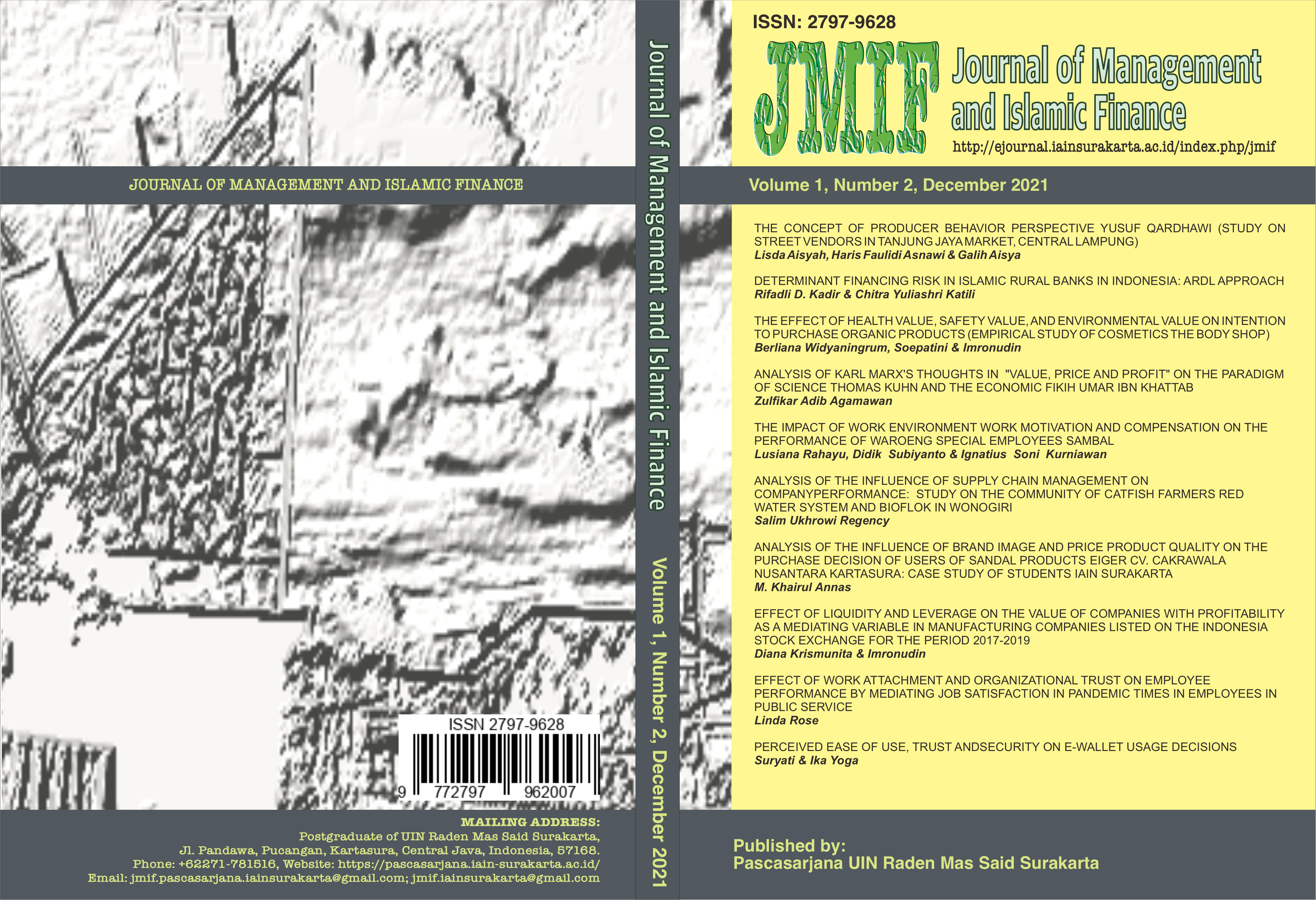THE ROLE OF EMPLOYMENT ENGAGEMENT AND ORGANIZATIONAL TRUST ON EMPLOYEE PERFORMANCE
MEDIATION OF JOB SATISFACTION IN PANDEMIC CONDITION FOR PUBLIC SERVICES EMPLOYEES
DOI:
https://doi.org/10.22515/jmif.v1i2.4691Keywords:
Work Engagement, Organizational Trust, Job satisfaction, Employee Performance.Abstract
Downloads
References
Brown, S., Mcnabb, R., Brown, S., & Mcnabb, R. (2011). and Loyalty Workplace Performance , Worker Commitment and Loyalty. 5447.
Buil, I., Martínez, E., & Matute, J. (2019). Transformational leadership and employee performance: the role of identification, engagement and proactive personality. International Journal of Hospitality Management, 77, 64–75. https://doi.org/10.1016/j.ijhm.2018.06.014
Choo, L. S., Mat, N., & Al-Omari, M. (2013). Organizational practices and employee engagement: A case of Malaysia electronics manufacturing firms. Business Strategy Series, 14(1), 3–10. https://doi.org/10.1108/17515631311295659
Choon, J., Chai, Y., Malhotra, N. K., & Alpert, F. (2015). Journal of Retailing and Consumer Services A two-dimensional model of trust – value – loyalty in service relationships. Journal of Retailing and Consumer Services, 26, 23–31. https://doi.org/10.1016/j.jretconser.2015.05.005
Eliyana, A., Ma’arif, S., & Muzakki. (2019). Job satisfaction and organizational commitment effect in the transformational leadership towards employee performance. European Research on Management and Business Economics, 25(3), 144–150. https://doi.org/10.1016/j.iedeen.2019.05.001
Ferdinand, A. (2014). Metode Penelitian Manajemen. Pedoman Penelitian untuk Penulisan Skripsi, Tesis dan Disertasi Ilmu Manajemen (5th ed.). Undip Press.
Handayani, F. (2016). Hubungan antara kepuasan kerja dengan kinerja Karyawan Bagian produksi PT X di Pasuruan. Calyptra: Jurnal Ilmiah Mahasiswa, 5(1).
Huselid Becker. (1997). Research in personnel and human resources management Volume 15. 16, ix.
Karen Mishra, Lois Boynton, and A. M. (2014). Driving employee engagement. Industry Week, 253(9), 74. https://doi.org/10.1177/2329488414525399
Martins, N. (2002). A model for managing trust. International Journal of Manpower, 23(8), 754–769. https://doi.org/10.1108/01437720210453984
Meng, J., & Berger, B. K. (2019). The impact of organizational culture and leadership performance on PR professionals’ job satisfaction: Testing the joint mediating effects of engagement and trust. Public Relations Review, 45(1), 64–75. https://doi.org/10.1016/j.pubrev.2018.11.002
Ozmen, Y. S. (2018). How employees define organisational trust: analysing employee trust in organisation. Journal of Global Responsibility, 9(1), 21–40. https://doi.org/10.1108/jgr-04-2017-0025
Rich, B. L., Lepine, J. A., & Crawford, E. R. (2010). Job engagement: Antecedents and effects on job performance. Academy of Management Journal, 53(3), 617–635.
Robbins, S. P., & Judge, T. . (2009). Organizational Behavior (Pearson Prentice Hall (ed.); 13th Ed).
Robbins, S. P., Judge, T. A., & Campbell, T. T. (2011). Organizational behavior. Pearson Prentice Hall.
Rusu, G., Avasilcăi, S., & Huţu, C.-A. (2016). Organizational Context Factors Influencing Employee Performance Appraisal: A Research Framework. Procedia - Social and Behavioral Sciences, 221, 57–65. https://doi.org/10.1016/j.sbspro.2016.05.090
Rutherford, B., Boles, J., Hamwi, G. A., Madupalli, R., & Rutherford, L. (2009). The role of the seven dimensions of job satisfaction in salesperson ’ s attitudes and behaviors. Journal of Business Research, 62(11), 1146–1151. https://doi.org/10.1016/j.jbusres.2008.10.019
Schaufeli, W. B., Bakker, A. B., & Salanova, M. (2006). The measurement of work engagement with a short questionnaire: A cross-national study. Educational and Psychological Measurement, 66(4), 701–716. https://doi.org/10.1177/0013164405282471
Setiawan, A. B., Ayu, A., & Bela, A. (2020). Pengaruh Kepercayaan Karyawan Terhadap Atasan dan Kepuasan Kerja Terhadap Kepercayaan Karyawan Kepada Organisasi. Business and Entrepreneurship Journal (BEJ), 1(2), 130–136.
Skaalvik, E. M., & Skaalvik, S. (2013). Teachers’ perceptions of the school goal structure: Relations with teachers’ goal orientations, work engagement, and job satisfaction. International Journal of Educational Research, 62, 199–209. https://doi.org/10.1016/j.ijer.2013.09.004
Spagnoli, P., Caetano, A., & Santos, S. C. (2012). Satisfaction with job aspects: Do patterns change over time ? Journal of Business Research, 65(5), 609–616. https://doi.org/10.1016/j.jbusres.2011.02.048
Steele, J., & Fullagar, C. (2009). Facilitators and outcomes of student engagement in a college setting. Journal of Psychology: Interdisciplinary and Applied, 143(1), 5–27. https://doi.org/10.3200/JRLP.143.1.5-27
Suripto, T. (2011). Pengaruh kepemimpinan organisasi dan komitmen organisasi terhadap kepercayaan organisasi dan kinerja karyawan. JBTI, 2(1).
Tkalac Verčič, A., & Pološki Vokić, N. (2017). Engaging employees through internal communication. Public Relations Review, 43(5), 885–893. https://doi.org/10.1016/j.pubrev.2017.04.005
Wulandari, F. (2021). Psychological Climate on Public Service Performance: the Mediating Role of Harmonious Passion and Organizational Commitment. International Journal of Economics, Business and …, 2021(2), 138–152.
Wulandari, Fitri, & Putriyanti, O. A. (2020). Studi share leadership dan perannya dalam meningkatkan kinerja karyawan. Jurnal Bisnis Dan Manajemen, 7(2), 74–84.
Downloads
Published
Issue
Section
Citation Check
License
Copyright (c) 2022 Linda Bangkit Sugesti

This work is licensed under a Creative Commons Attribution-ShareAlike 4.0 International License.
Authors who publish with this journal agree to the following terms:
- Authors retain copyright and grant the journal right of first publication with the work simultaneously licensed under a Creative Commons Attribution License that allows others to share the work with an acknowledgement of the work's authorship and initial publication in this journal.
- Authors are able to enter into separate, additional contractual arrangements for the non-exclusive distribution of the journal's published version of the work (e.g., post it to an institutional repository or publish it in a book), with an acknowledgement of its initial publication in this journal.
- Authors are permitted and encouraged to post their work online (e.g., in institutional repositories or on their website) prior to and during the submission process, as it can lead to productive exchanges, as well as earlier and greater citation of published work.






